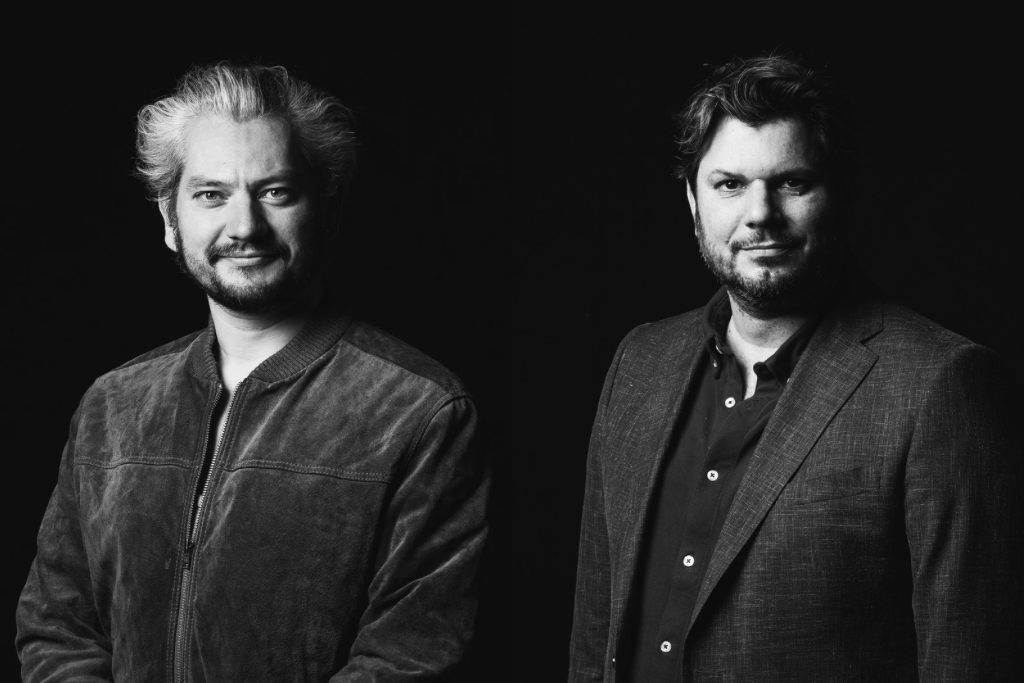Theatre animals on the opera stage
Both come from the world of theatre, and both are now diving headfirst into Die Dreigroschenoper. We speak to director Servé Hermans and actor-singer Maarten Heijmans just as rehearsals have begun. How does it feel to be working on an opera? How do they see the character of Macheath? And what do they think of the music in this iconic masterpiece?
This is your operatic debut for both of you. How’s that experience been so far?
Servé: ‘Our hope and ambition is that theatre and opera will enhance each other in this production – that together they’ll become more than the sum of their parts. There’s a lot of spoken dialogue, so this is really a show for stage animals. The singers are incredibly talented in that respect. They love embracing the adventure. You can feel that.’
Maarten: ‘Absolutely! I’m thrilled to be playing the iconic role of Macheath. This piece sits right on the edge between theatre and opera, so it doesn’t feel entirely foreign to me.’
How is your collaboration going so far?
Maarten: ‘I feel like we really understand each other – partly because we come from the same (theatre) world. And I sense that we both want the very best for the production. So I really enjoy being part of Servé’s direction.’
Servé: ‘I find Maarten incredibly inspiring – one of the most complete actor-singers out there. He’s a dangerous performer, but also funny, and he can actually sing everything. That makes him unique – for me, the perfect Mack the Knife.’
Maarten (softly): ‘That’s lovely to hear.’
What do you mean by ‘dangerous’?
Servé: ‘There’s a great sense of unpredictability and creativity in his acting. Sometimes Maarten approaches a scene in such an unusual way that it suddenly makes perfect sense – just not in the way you expected. Maartje [Rammeloo, ed.] has that too. She can play with a beautiful volatility. I find that incredibly exciting in this piece.’
How did you both prepare for this opera?
Maarten: ‘Just like for a play, I read up on it and watched the film version of The Threepenny Opera. Opera singers usually know their vocal parts before rehearsals even start – in theatre, that’s not the case. We normally begin from scratch on day one. Luckily, I pick up the music quite quickly; I just have to get used to the German text. That’s been the biggest challenge for me so far.’
Servé: ‘Alongside countless conversations with the creative team, I make endless little sketches. That way I can clearly see how the mise-en-scène works, how the piece moves from beginning to end. I create the general structure, and then I respond to what the performers bring to the table. The most important thing is that our direction creates a certain distance – because of the Verfremdungseffekt. According to Brecht, the audience shouldn’t identify too closely with the characters, so the message can come through more clearly. That’s why I try to present the text as plainly and neutrally as possible, so the audience can – if they wish – pick out the themes for themselves.’
Maarten, how do you want to portray Macheath?
Maarten: ‘Macheath is a ruthless murderer, a charming criminal, and sometimes a bit of a fool. He gets thrown in jail, escapes, then lands back there again because he needs validation from a woman. That complexity is what makes the role so much fun to play. When things contradict or rub up against each other, that’s when it becomes truly interesting for me.’
What do you both think of Weill’s eclectic music?
Servé: ‘I think it’s fantastic! The lyrics are sharp, cheeky, brutal, even grotesque – but the music itself has something comforting and full about it. That combination is absolutely brilliant.’
Maarten: ‘I don’t find the music beautiful in a conventional sense – it’s a bit eerie… circus-like, playful. And it’s funny, too – at least, I think so.’
How do you hope the audience will feel as they leave the theatre?
Maarten: ‘I hope they’ll be whistling the melodies on their way out. Any moral lessons they take away will probably surface later on, subconsciously – but not right then and there. That’s not how theatre works, in my view.’
Servé: ‘This piece is funny, but it actually shows a rotten world. We see a society where everyone wants to make things better for themselves – not, or even at the expense of, others. How much more relevant can you get? The Threepenny Opera gives a dystopian vision of what happens when civilisation becomes over-civilised. But I don’t make political theatre. And The Threepenny Opera will never shove its message down your throat. It offers you glorious music, vivid characters, humour, sensuality… and a world that’s utterly broken. Do with that what you will.’
Interview: Kyra Bertram
